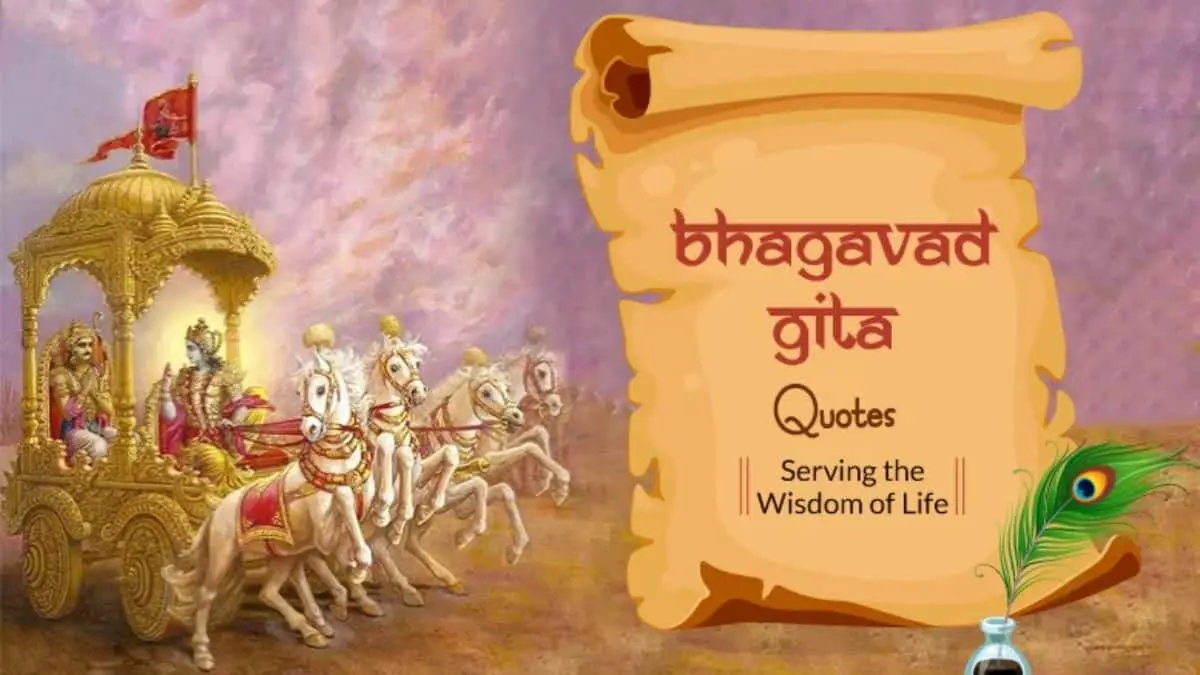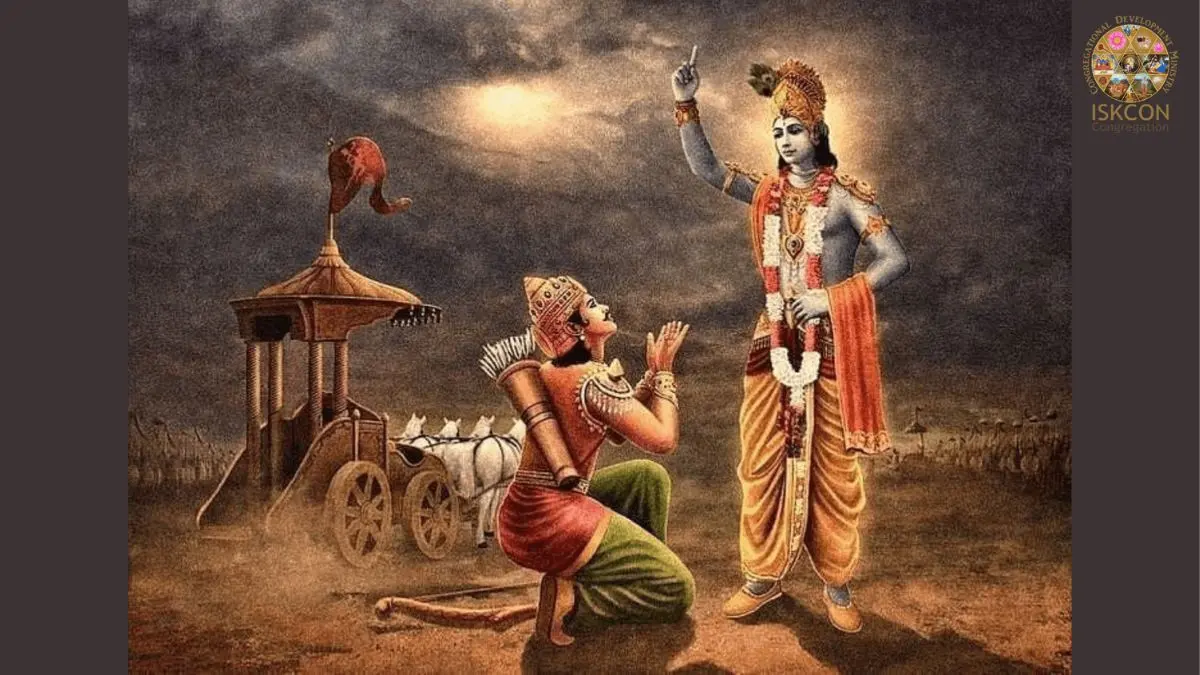The Bhagavad Gita, a part of the epic Mahabharata, is a 700-verse Hindu scripture providing deep insights into spirituality, morality, and philosophy. Here are 20 significant quotes from this revered text, each offering wisdom on various aspects of life and the eternal duties of humans, guiding followers towards understanding the essence of existence, righteousness, and the path to spiritual enlightenment.
“There are three gates leading to the hell of self-destruction for the soul—lust, anger, and greed.” – Chapter 16, Verse 21
This quote warns against the destructive effects of lust, anger, and greed. It identifies these traits as pathways to spiritual downfall. The quote urges individuals to steer clear of these negative qualities. By avoiding them, one can attain inner peace and foster spiritual growth.
“When meditation is mastered, the mind is unwavering like the flame of a lamp in a windless place.” – Chapter 6, Verse 19
This quote metaphorically depicts perfect concentration from meditation, where the mind is steady and calm, unaffected by outside distractions. It symbolizes achieving inner peace and clarity, highlighting meditation’s power to stabilize the mind and bring about a tranquil state of being.
“As the kindled fire consumes the fuel, so in the flame of wisdom the embers of action are burnt to ashes.” – Chapter 4, Verse 37
This quote illustrates that wisdom acts like a powerful fire, burning away the consequences of actions. It suggests that an enlightened understanding can purify life, freeing one from the cycle of karma. Through wisdom, individuals can transcend the bindings of their past deeds.
“Those who are free from anger and all material desires, who are self-realized, self-disciplined, and constantly endeavoring for perfection, are assured of liberation in the Supreme in the very near future.” – Chapter 5, Verse 26
This quote emphasizes the virtues of self-discipline, freedom from anger and desires, and the continuous pursuit of perfection, stating that these qualities lead directly to liberation and unity with the divine.
“He who has no attachments can really love others, for his love is pure and divine.” – Chapter 5, Verse 6

This quote suggests that true love is selfless and unattached, implying that without personal desires or expectations, one can love others more purely and deeply, reflecting a divine quality of love.
“The soul is never born nor dies at any time. Soul has not come into being, does not come into being, and will not come into being.” – Chapter 2, Verse 20
This quote speaks to the eternal nature of the soul, asserting its immortality and unchanging essence, and providing a profound perspective on life and existence beyond physical death.
”Among all kinds of killers, time is the ultimate because time kills everything.” – Chapter 10, Verse 34
This quote acknowledges time as the ultimate force that eventually brings an end to all things, highlighting the impermanent nature of the physical world and urging a focus on the eternal spiritual path
“One who sees inaction in action, and action in inaction, is intelligent among men.” – Chapter 4, Verse 18″
This quote reflects the deep wisdom of understanding the true nature of action and inaction, suggesting that the wise can see beyond the surface and understand the underlying reality, where true action lies in detachment and the right understanding of one’s duties.
Whenever there is a decline in righteousness and an increase in unrighteousness, O Arjuna, at that time I manifest Myself on earth.” – Chapter 4, Verse 7
This verse from the Bhagavad Gita speaks to the divine promise of preservation and restoration of moral order, indicating that whenever there is a significant shift away from dharma (righteousness), the divine will incarnate in a form to restore balance and guide humanity back to the path of virtue and righteousness.
“You have the right to work, but never to the fruit of work.” – Chapter 2, Verse 47

This profound teaching emphasizes the importance of duty and action without attachment to outcomes, advocating for a mindset where one focuses on the task at hand with dedication and integrity while relinquishing the desire for specific results, thus promoting a life of selflessness and equanimity.
“For one who has been honored, dishonor is worse than death.” – Chapter 2, Verse 34
This quote reflects how ancient warrior culture deeply values honor and reputation, suggesting that those who live a life of respect and esteem consider facing dishonor a fate worse than death, thus underscoring the heavy weight of social standing and personal dignity.
“He who is devoid of attachment, fear, and anger, and who is filled with me, is dear to me.” – Chapter 12, Verse 14
In this verse, Lord Krishna expresses high regard for those free from attachments, fear, and anger, and filled with a sense of divine presence, highlighting detachment, inner peace, and devotion as pathways to becoming dear to the divine.
“For one who has conquered the mind, the mind is the best of friends; but for one who has failed to do so, his very mind will be his greatest enemy.” – Chapter 6, Verse 6
This teaching illustrates the dual nature of the mind; it can be an invaluable ally leading to enlightenment and self-realization when controlled, or a destructive force leading to downfall and misery when left unchecked, emphasizing the critical importance of self-mastery and mental discipline.
“Happiness from the senses seems like nectar at first, but it is bitter as poison in the end.” – Chapter 18, Verse 38
This verse warns against the temporary and ultimately unsatisfying nature of sensory pleasures, suggesting that what initially appears as delightful can lead to suffering and spiritual degradation, thus advocating for a life focused on deeper, more enduring sources of happiness.
“The power of God is with you at all times; through the activities of mind, senses, breathing, and emotions; and is constantly doing all the work using you as a mere instrument.” – Chapter 18, Verse 61

This quote conveys that an omnipresent, omnipotent divine pervades all existence with its energy. It asserts that individuals serve as instruments for the universal will, encouraging humility and surrender to the divine flow.
“Even a little effort toward spiritual awareness will protect you from the greatest fear.” – Chapter 2, Verse 40
This verse implies that small steps towards spiritual growth protect against deep fears and anxieties. It suggests spirituality is about incremental progress, with every effort counting significantly towards ultimate liberation.
“It is better to live your own destiny imperfectly than to live an imitation of somebody else’s life with perfection.” – Chapter 3, Verse 35
This statement advocates for authenticity and one’s own path. It emphasizes that living your unique purpose, despite flaws, is more valuable and satisfying than perfectly imitating someone else’s life. It stresses the importance of aligning with your true nature and calling.
“The peace of God is with them whose mind and soul are in harmony, who are free from desire and wrath, who know their own soul.” – Chapter 5, Verse 26
This quote stresses that attaining divine peace involves harmonizing the mind and soul. It requires transcending desires and anger. Deep awareness and understanding of one’s true spiritual nature are essential. These elements together lead to divine peace.
“A person is said to be established in self-realization and is called a yogi [or mystic] when he is fully satisfied by virtue of acquired knowledge and realization.” – Chapter 6, Verse 8
This passage describes self-realization as the ultimate satisfaction. It comes from deep spiritual knowledge and enlightenment. It highlights that a true yogi lives in contentment, deeply understanding and united with the divine.
“To those who have conquered themselves, the will is a friend. But it is the enemy of those who have not found the Self within them.” – Chapter 6, Verse 6

This verse teaches that self-mastery makes the will a powerful ally. It leads to inner harmony and purpose. However, without self-awareness, the will may cause internal conflict and suffering.
Also Read: Ten Life Lessons to Learn From the Bhagwat Geeta









